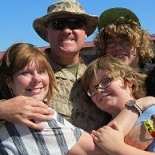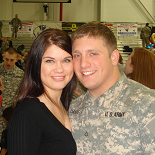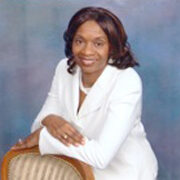Caregiver Profile: Ashley
The Endless Balancing Act of a Caregiver
The military often ends up being a “family business.” Recent data from the Defense Department showed that 3 out of 4 recent recruits had at least one parent, grandparent, aunt or uncle, sibling or cousin who served in the armed forces in some capacity. And likewise, it’s not uncommon for a woman who marries a man in the military to have grown up in a military family. Not so for Ashley Jackson. While she had a few relatives who had served, the military life was pretty alien to her, and even after seven years of marriage to a soldier, she does not feel particularly good at it.
“I am a horrible Army wife,” Ashley admits, but she also explains she had to prioritize. “I had the choice of learning the ins and outs of being an Army wife or trying to figure out what was wrong with my daughter. It’s very hard to do both.”
Ashley is one of many young spouses whose limited time and devotion needs to be divided between a spouse, who needs additional care after returning from war with injuries, and young children, some with special needs, who require the love and care of a parent.
A CHANCE MEETING
Ashley met Chris on a blind date in Richmond, Indiana, in October 2008. She was living there with her daughter, a toddler. Chris, who was in the Indiana National Guard, was staying at his grandparents’ house following his first deployment in Kosovo. Chris was raised in a military family. His father and grandfather both served, and he wanted eventually to be a Ranger, although his real love was muscle cars. Chris started in infantry training out of high school and then joined the National Guard so he could simultaneously pursue a career in automotives.

When he and Ashley met, Chris was planning to move east to Pennsylvania to start automotive school at WyoTech. So the two began a long distance relationship. They saw each other about one weekend a month, while Chris took classes. But in May, just a few months into his program, he took a leave for Annual Training and then found out he was being deployed. They got married quickly in August 2009, and then Chris continued his training at Camp Atterbury until he was deployed to Afghanistan in February.
In the meantime, Ashley was raising her daughter and expecting another baby. Chris was able to take R&R and get home for the birth of his daughter, who was born in May of 2010, but before long he headed back to Afghanistan to rejoin his unit on a Joint Task Force. Over the next six months, Chris began his transition back to the United States, while Ashley tried her best to troubleshoot their baby’s health issues without burdening him. The doctors couldn’t figure out why she could not tolerate solid foods, and Chris could hear the baby screaming when they talked on the phone or video chatted. In November, when Ashley finally told him what was going on, Chris requested early leave. He came home about a week before the rest of his unit.
“I knew something was wrong within a week of him getting home,” Ashley says. “He wasn’t overwhelmingly excited to see his kids, like you would imagine someone who hasn’t seen his kids in over six months would be.” Chris was detached from the children and distant with his wife. Although their 6-month old could not keep her food down, Chris denied that anything was wrong, even as Ashley dragged him from doctor to doctor.
INVISIBLE WOUNDS WITHOUT ANY OBVIOUS INJURY
There was no obvious reason for Chris’s behavior. His unit had been in just one firefight and confronted one improvised explosive device (IED) – with Chris driving – but in both cases, no one was injured. There was a helicopter crash with men from his deployment, but he didn’t know any of the soldiers who were killed. Ashley’s best guess is that Chris blames her for his early leave. But even after almost six years, his problems persist. He has a hard time finding support and is working to find the right doctor at the VA to help him. Ashley says he is withdrawn, anxious, and depressed.
“He prefers to sit on the couch and drink beer all day, that would be his ideal life, and working on vehicles and shooting guns,” Ashley says. “He’s no longer someone who can sit down and play and have family time.” In February of 2016, he was medically retired from the military.
“[My coach] knows what I’m going through. She’s the only support system I have.”
Ashley, however, has found the help she needs. In 2013, she came across a flier for Operation Family Caregiver (OFC), offered locally through the Conemaugh Health System. OFC was founded by the Rosalynn Carter Institute for Caregiving to support military caregivers. The program links spouses and other caregivers with personal coaches to help them navigate the unexpected challenges that emerge when their loved one returns home. Ashley’s coach Lisa has helped her identify and take advantage of the resources offered to military families: finding child care while she went to school, for example, and figuring out their financial needs in order to relocate down south. “She knows what I’m going through,” Ashley says. “She’s the only support system I have.”
FORGING A PATH FORWARD
Ashley doesn’t necessarily think of herself as a caregiver—and certainly not for her husband. Their daughter, now 6, is still coping with digestive problems and is constantly having to adjust her diet. Older now, she hates her body, which Ashley understands but is disheartened by. As a mom, Ashley’s focus is on helping her daughter get healthy. And she is forging ahead toward a career in education. She finished her degree in early childhood education last December and earned a teaching certificate. Currently an assistant director at a daycare, she is planning to continue her education and pursue a master’s degree in special education.
“[Chris] is on the path [to recovery], it’s just a very, very long path,” she says. “Because you can’t overcome it, you just live with it and make it not overwhelm you. So we’re on the path to that, but it’s just a very long path.”
CAREGIVER STORIES

Meet Nikki
Meet Nikki
She found the strength to support her husband and her family.

Meet Gina
Meet Gina
For years she has taken care of her husband and her family. Now she’s finally taking care of herself.

Meet Kristin
Meet Kristin
She saw a glimpse of the man Matt used to be, before he was injured in Iraq. Now she struggles as his caregiver.

Meet Ashley
Meet Ashley
How an Army wife balances caring for her husband, who struggles with PTSD, and a daughter with special needs.

Meet Breanna
Meet Breanna
She is a strong woman who fell in love with a Marine. After his injury, she became a caregiver to her husband.

Meet Amber
Meet Amber
She married her childhood crush and had no idea he would be a stranger she had known forever.

Meet Krista
Meet Krista
She’s always sought a purpose, now she has a new one.

Meet Violet
Meet Violet
A wife, mother, and sister who finds strength in her faith and brings strength to her family.

Meet Danielle
Meet Danielle
She answered an online dating request and soon found herself a caregiver.

Meet Dee
Meet Dee
She took care of everyone — her children, her husband, her friend — until, finally, she decided to take care of herself.

